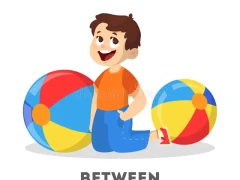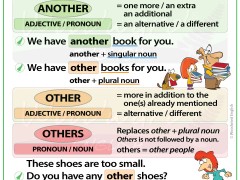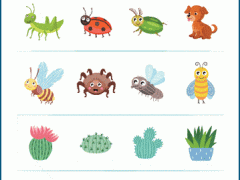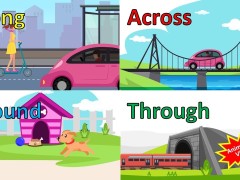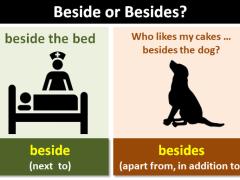photograph [ˈfəutəɡrɑːf] n. 照片
village [ˈvilidʒ] n. 村庄
【派】villager 村民
【扩】hamlet 村庄
* * *
A: What's that movie about?
B: It tells a story about a teacher and a group of children in a village.
A:这部电影讲的是什么?
B:它讲述的是山村里的一个老师和一群孩子的故事。
* * *
valley [ˈvæli] n. 山谷
between [biˈtwiːn] prep. 在……之间
【扩】during 在……期间
【搭】in between 在中间
* * *
A: What time do you think I could see him?
B: Let me see. He's free between 10:00 to 11:00 a.m. tomorrow.
A:您看我什么时候能见他?
B:让我查一查。他明天上午10点至11点之间有空。
* * *
hill [hil] n. 小山
another [əˈnʌðə] pron. 另一个
【搭】one another 互相
* * *
A: How long would you like to renew?
B: Another two weeks.
A:你想续租多久?
B:两个星期。
* * *
wife [waif] n. 妻子
【扩】girlfriend 女朋友
【搭】former wife 前妻
* * *
A: Have you used any hotel service?
B: Yes, my wife just has some clothes cleaned and pressed.
A:你们有没有使用旅馆的服务设施?
B:用过,我妻子刚刚洗熨了几件衣服。
* * *
along [əˈlɔŋ] prep. 沿
【搭】get along with 相处得……
all along 一直
* * *
A: I'm planning to go on a package tour along the Silk Road with my brother.
B: How wonderful! For a package tour, you don't have to worry about accommodation, transportation or meals.
A:我想和哥哥一起参加丝绸之路全包服务性旅游团。
B:太棒了。参加全包服务性旅游,你不用操心住宿、交通和膳食。
* * *
bank [bæŋk] n. 河岸
water [ˈwɔːtə] n. 水
swim [swim] v. 游泳
【派】swimming 游泳
【扩】backstroke 仰泳 butterfly stroke 蝶泳 breaststroke 蛙泳
* * *
A: I didn't even know you could swim.
B: In fact, I often go swimming in the weekend.
A:我都没听说过你会游泳。
B:事实上,周末的时候我经常去游泳。
* * *
building [ˈbildiŋ] n. 大楼,建筑物
* * *
A: Are there any vacant rooms in this building?
B: I am not sure about that. Maybe John could give us an answer.
A:这幢楼里还有空房间吗?
B:我不确定,也许约翰可以给我们一个答案。
* * *
park [pɑːk] n. 公园
【派】parking 停车
【搭】national park 国家公园
forest park 森林公园
* * *
A: It seems a long time since we met in the park.
B: Yes, it does. I'm busy writing my letter of application and preparing for the interview.
A:自从咱们在公园里碰面以来似乎已有好长一段时间了。
B:是啊,我正忙着写求职信准备面试。
* * *
into [ˈintu, ˈintə] prep. 进入
* * *
A: Could you tell me where I can change dollars into Chinese currency in China?
B: At the bank or at the foreign exchange desk in your hotel.
A:你能告诉我在中国我可以在什么地方把美金换成人民币吗?
B:在银行或在你住的旅馆里的外币兑换处。
Lesson 36 Where...?……在哪里?
beside [biˈsaid] prep. 在……旁
【扩】near 在……旁边
* * *
A: I'll try to consult with the person beside her to exchange seats with you.
B: Do you think he will agree?
A:我尽量和她边上的人商量一下,跟您换个位子。
B:你认为他会答应吗?
* * *
off [ɔ(ː)f] prep. 离开
【搭】off time 不合时宜 off day 休息日
* * *
A: I'd like to take myself off right now.
B: OK. I'll get your bill prepared soon.
A:我现在就要离开。
B:好的,我马上把您的账单准备好。
noun [专属名词]照片,相片 - The photograph had been framed.
verb [vi. 不及物动词]拍照,照相;在照片上显出某种样子 - The photograph showed him to advantage.
noun [具体名词]乡村,村庄;在乡村的,乡村的;村民;(城市中带有村庄特点的)生活小区,居民区;<美>(有有限自治权的)小自治市;<澳新>高级城郊购物中心;(动物的)群落 - He lives quietly in the country in a village near Lahti.
noun [具体名词]山谷;流域;溪谷 - A milky mist filled the valley.
noun [具体名词]国,国家;全国人民,全体国民(the country);乡下,乡村;地区,区域;乡村音乐;故乡 - Australia's a big country.
adjective [原级]乡下的,农村的;乡村音乐的;祖国的,故乡的;粗鲁的 - I'm a simple country girl.
- the country 在乡下
- in the city 在城里
- in the village 在 村 里
- in my country 国家
- Which country do you come from?
- He had planned to settle down in the country.
preposition [位置和方向](空间上)在…中间;(时间上)在…之间;(数量、重量、距离等)介于…之间;分隔着;(表示两方或多方关系)在…之间;合用,共享;通过共同努力,一起;(两人)私下间;往返于 - She left the table to stand between the two men.
adverb [地点副词](空间或时间上)介于…之间(in between) - My life had been a journey from crisis to crisis with only a brief time in between.
noun [具体名词]山丘,小山;(道路的)斜坡;土堆,小堆;<美,非正式>国会山 - ...the shady street that led up the hill to the office building. …
verb [vt. 及物动词]使成堆 - A hawk hovered over the hill.
noun [具体名词]山,高山;许多,大量(a mountain/mountains of);(食物的)过剩,积压 - Mt. McKinley, in Alaska, is the highest mountain in North America.
pronoun [指示代词]又一个,再一个;另一个,另一种;不确切的事物,某些事物(用于与 one 或 some 构成的短语) - He didn't really believe that any human being could read another's mind.
adjective [原级]再加一个的;另一的,不同的;另一类似的 - They had faced one difficulty after another with bravery and dedication.
adjective [原级](表示与已知的人或事物不同)别的,另外的;(表示在与已知的人或事物同一类中)别的,另外的;(两个中)另一的;(一组人或事物中)其余的;(用于列举之后)其他的;对面的,相反方向的;(泛指)别(人)的,他(人)的;最近的,前不久的 - You use other to indicate that a thing or person is not the one already mentioned, but a different one.
pronoun [指示代词](表示与已知的人或事物不同)另外;(表示在与已知的人或事物同一类中)另外;(两个中)另一个(the other);其余的人(或事物)(the others);(用于列举之后)其他;对面,相反方向(the other);<非正式>性交(the other) - Four crewmen were killed, one other was injured.
verb [vt. 及物动词]将…看作异类,以异类对待 - Partition would give licence to other aggressors in other conflicts.
noun [具体名词]妻子,已婚妇女;夫人 - He married his wife Jane 37 years ago.
preposition [位置和方向]沿着,顺着;靠着…边;在某处 - Pedro walked along the street alone.
adverb [方式副词]向前;一起,一道;进行,进展;(前)来,到某处;到相当的程度;传播 - When someone or something moves along, they keep moving in a particular direction.
verb [vt. 及物动词]应在…地方,应处于…状况;适应,合得来;归…所有;是…的成员,属于(某团体或组织);居住 - Lions belong to the cat family.
belong to
belong to me\ her\ him\ them\ us
- The freedom belongs to me. 自由属于我。
- The happiness belongs to us.幸福属于我们。
noun [专属名词]银行;储蓄罐;库存,库;河岸;斜坡;云团,雾团;一排,一组;庄家的赌本;(泥)滩,沙洲 - A bank is a building where a bank offers its services.
verb [vt. 及物动词]把(钱)存入银行,把…储存入库;与银行有业务往来;(飞机)倾斜飞行;使反弹;(把某物)堆积起来,聚集起来;(用煤等)封炉火 - If you bank with a particular bank, you have an account with that bank. (
noun [不可数名词]水,雨水;水域,(江、河、湖、海等)大片的水;(某个国家的)领海,海域(waters);不明朗(或未知的、困难、危险等)局面 - Get me a glass of water.
verb [vt. 及物动词]给…浇水,灌溉;给…...水喝,饮(动物);(风等使眼睛)流泪;流口水;(江河)流经并给(某地区)供水;加水冲淡,稀释 - If you water plants, you pour water over them in order to help them to grow.
verb [vi. 不及物动词]游泳;横渡;游(某一泳姿);(鱼、禽等)游过,游动;浸,泡;漂浮;使漂浮,使渡过;(物体)仿佛旋转;眩晕 - I managed to swim to safety.
noun [抽象名词]游泳;(河流中)适合钓鱼的静止深水处,深潭;漂浮;眩晕 - How many widths can you swim?
adjective [原级]游泳时穿戴的 - I had a swim to cool down.
adverb [方式副词]从一边到另一边;在…对面;朝,向;宽;横向字谜答案 - Across is also an adverb.
preposition [方式和原因]从一边到另一边;横过,穿过;在…对面;遍及;在…上;跨越(政治、宗教、社会隔阂等) - If something is situated or stretched across something else, it is situated or stretched from one side of it to the other.
noun [具体名词]建筑物,房屋,楼房;建筑,建筑业 - They were on the upper floor of the building.
verb [vt. 及物动词]建造,修建;发展,建立;逐渐增强 - There are no plans to build new offices.
noun [具体名词]体形,体格;(尤指车辆的)造型,构造;构件 - The media has given the show a huge build-up.
noun [具体名词]公园;自然保护区;(乡间大宅的)庭园,园林;<英>足球场,橄榄球场;运动场,(尤指)棒球场;专用区,园区;<英>停车场;(汽车)制动 - You can refer to a place where a particular activity is carried out as a park. (
verb [vt. 及物动词]停车,泊车;存放,寄存; (在某处)坐,站立(park yourself);<非正式>把…搁置,推迟 - When you park a vehicle or park somewhere, you drive the vehicle into a position where it can stay for a period of time, and leave it there.
noun [具体名词]停车,泊车;停车场,停车位 - Parking is space for parking a vehicle in.
verb [vi. 不及物动词]存放,寄存;停车,泊车;坐下(或站着)(park 的现在分词形式) - There is ample car parking off site.
preposition [状态和条件]到…里面;触及,碰撞;朝,向;转向;关于;转变成;造成(某种结果);除;<非正式>对…很有兴趣;从事(某职业等);被迫做,被说服做;成为…的一部分;持续到,直到 - If one thing goes into another, the first thing moves from the outside to the inside of the second thing, by breaking or damaging the surface of it. (
verb [vt. 及物动词]进入;开始从事,开始做;参加,报名;登记,输入;正式提出;登场 - He entered the room briskly and stood near the door.
noun [具体名词]回车键(电脑键盘) - Knock before you enter.
preposition [位置和方向]在…旁边,在…附近;与…相比;除…以外(还),除…以外(不再) - On the table beside an empty plate was a pile of books.
adverb [地点副词]在附近;况且,此外 - He sat beside her all night.
adverb [关系副词]离开(某处),(在时间或空间上)距,离;从…移开,从…脱离;不再会发生,被取消;关掉,切断;没有,不再供应;不上课,不工作,休息;削价,减价;入睡;做完,光;获得,拥有;<英>(接在数词后)一次的产量;在剧院舞台的后面(或旁边) - Lee broke off a small piece of orange and held it out to him.
preposition [方式和原因]从…离开,向下;靠近,离…不远;从…去掉,从…移开;低于…水平;远离;不上课,不工作,休息;依靠…(过活);(表示来源或原因)来自,由于 - Lee broke off a small piece of orange and held it out to him.
adjective [原级](食物)不新鲜的;<非正式>令人不快的,不公平的;<英,非正式>不友好的,敌对的;状态不如平常好的;<美>不正确的,不对的;微小的;不连接的,不盖在上面的;萧条的,淡季的;离开家的,不工作的;不运转的,不运作的;<英>(一对之中)右边的,右侧的 - If food has gone off, it tastes and smells bad because it is no longer fresh enough to be eaten. (
noun [抽象名词]起跑,开始,出发(the off);(板球)击球手对面的半场 - He was just about to drive off when the secretary came running out.
verb [vt. 及物动词]<美>杀死(某人);<非正式>离开 - As he pulled into the driveway, he saw her bedroom light was off.




